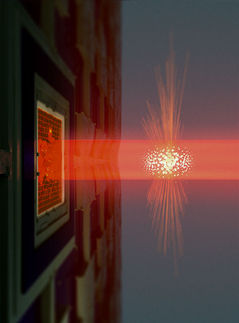New technique improves optical fiber communication
Advertisement
Energy loss due to scattering from material defects is known to set limits on the performance of nearly all technologies that we employ for communications, timing, and navigation. In micro-mechanical gyroscopes and accelerometers, such as those commonly found in cellphones today, microstructural disorder impacts measurement drift and overall accuracy of the sensor, analogous to how a dirty violin string might impact one's enjoyment of beautiful music. In optical fiber communication systems, scattering from material defects can reduce data fidelity over long distances thereby reducing achievable bandwidth. Since defect-free materials cannot be obtained, how can we possibly improve on the fundamental technological limits imposed by disorder?

This is a microscope image of a silica glass resonator and optical fiber waveguide. Light and sound circulating in this type of resonator are shown to exhibit chiral effects in this study.
Gaurav Bahl, University of Illinois Department of Mechanical Science and Engineering
A research collaboration between the University of Illinois at Urbana-Champaign, the National Institute of Standards and Technology, and the University of Maryland has revealed a new technique by which scattering of sound waves from disorder in a material can be suppressed on demand. All of this, can be simply achieved by illuminating with the appropriate color of laser light. The result could have a wide-ranging impact on sensors and communication systems.
Gaurav Bahl, an assistant professor of mechanical science and engineering, and his research team have been studying the interaction of light with sound in solid state micro-resonators. This new result is the culmination of a series of experiments pursued by his team over the past several years, and a new scientific question posed in the right place.
"Resonators can be thought of as echo chambers for sound and light, and can be as simple as micro-spherical balls of glass like those we used in our study," Bahl explained. "Our research community has long understood that light can be used to create and amplify sound waves in resonators through a variety of optical forces. The resonant echoes help to increase the interaction time between sound, light, and material disorder, making these subtle effects much easier to observe and control. Since interactions within resonators are fundamentally no different from those taking place in any other system, these can be a really compact platform for exploring the underlying physics."
The key to suppressing scattering from disorder is to induce a mismatch in the propagation between the original and scattered directions. This idea is similar to how an electric current prefers to flow along the path of least resistance, or how water prefers to flow through a wider pipe rather than a constricted one. To suppress back-scattering of forward-moving sound waves, one must create a large acoustic impedance in the backward direction. This asymmetry for forward and backward propagating waves is termed as chirality of the medium. Most solid-state systems do not have chiral properties, but these properties can be induced through magnetic fields or through space-time variation of the medium.
"A few years ago, we discovered that chirality can be induced for light using an opto-mechanical phenomenon, in which light couples with propagating sound waves and renders the medium transparent. Our experiments at that time showed that the induced optical transparency only allows light to move unidirectionally, that is, it creates a preferentially low optical impedance in one direction," Bahl said. "It is then that we met our collaborator Jacob Taylor, a physicist at NIST, who asked us a simple question. What happens to the sound waves in such a system?"
"Our theoretical modeling predicted that having a chiral system for sound propagation could suppress any back-scattering that may have been induced by disorder," explained Taylor. "This concept arose from work we've been doing in the past few years investigating topological protection for light, where chiral propagation is a key feature for improving the performance of devices. Initially the plan with Bahl's team was just to show a difference between the forward and backward propagating sound waves, using a cooling effect created by light. But the system surprised us with an even stronger practical effect than expected."
That simple question launched a new multi-year research effort in a direction that has not been explored previously. Working in close collaboration, the team discovered that Brillouin light scattering, a specific kind of opto-mechanical interaction, could also induce chirality for sound waves. Between the experimental tools in Bahl's lab, and the theoretical advancements in Taylor's lab, the pieces of the puzzle were already in place.
"We experimentally prepared a chiral optomechanical system by circulating a laser field in the clockwise direction in a silica glass resonator. The laser wavelength, or color, was specially arranged to induce optical damping of only clockwise sound waves. This created a large acoustic impedance mismatch between clockwise and counter-clockwise directions of propagation," explained Seunghwi Kim, first author of the study. "Sound waves that were propagating the clockwise direction experienced very high losses due to the opto-mechanical cooling effect. Sound waves moving in the counter-clockwise direction could move freely. Surprisingly, we saw a huge reduction of scattering loss for counter-clockwise sound waves, since those waves could no longer scatter into the clockwise direction! In other words, even though disorder was present in the resonator, its action was suppressed."
Just as sound is the primary method of voice communication between humans, electromagnetic waves like radio and light are the primary technology used for global communications. What could this discovery mean for the communications industry? Disorder and material defects are unavoidable optical fiber systems, resulting in lower data fidelity, bit errors, and bandwidth limitations. The team believes that technologies based on this discovery could be leveraged to circumvent the impact of unavoidable material defects in such systems.
"We've seen already that many sensors, such as those found in your phone or in your car, can be limited by intrinsic defects in the materials," added Taylor. "The approach introduced here provides a simple means of circumventing those challenges, and may even help us approach the limits set by quantum mechanics, rather than our own engineering challenges."
Practical applications of this result may not be too many years off. Reduction of mechanical losses could also directly improve mechanics-based inertial navigation sensors that we use today. Examples that we encounter in daily life are accelerometers and gyroscopes, without which our mobile phones would be a lot less capable, and our cars and airplanes a lot less safe.
Original publication
Other news from the department science
These products might interest you
Most read news
More news from our other portals
See the theme worlds for related content
Topic world Sensor technology
Sensor technology has revolutionized the chemical industry by providing accurate, timely and reliable data across a wide range of processes. From monitoring critical parameters in production lines to early detection of potential malfunctions or hazards, sensors are the silent sentinels that ensure quality, efficiency and safety.

Topic world Sensor technology
Sensor technology has revolutionized the chemical industry by providing accurate, timely and reliable data across a wide range of processes. From monitoring critical parameters in production lines to early detection of potential malfunctions or hazards, sensors are the silent sentinels that ensure quality, efficiency and safety.


























































